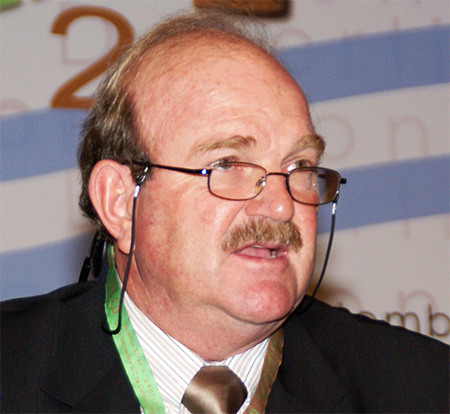Bush encroachment is a global challenge, but through the multi-million rand RIBS project, this major contributor to land degradation is being tackled with renewed vigour.
RIBS is an acronym for “Rangeland Improvement through Bush Control and Sustainable Intensification to mitigate Climate Change and improve Livelihoods and Food Security in Southern Africa”.
The project is funded by the Federal Ministry of Education and Research in Germany, through the Southern African Science Service Centre for Climate Change and Adaptive Land Management (SASSCAL 2.0) programme.
It is a collaborative effort between the North-West University (NWU), the University of Namibia, the Namibia University of Science and Technology, the Botswana University of Agriculture and Natural Resources and the Brandenburg University of Technology in Cottbus, Germany.
Bush encroachment refers to an increase in the density of indigenous woody species (trees and shrubs), leading to a reduction in forage production of rangelands. RIBS focuses on applying several methods for the control of indigenous woody species that cause encroachment.
The NWU’s Prof Klaus Kellner from the Unit for Environmental Sciences and Management at the Faculty of Natural and Agricultural Sciences is the principal investigator in South Africa and Namibia for parts of the RIBS project. He is responsible for 18 sites and 189 plots in Namibia and six sites with 126 plots in South Africa.
Bushes push out other species
“Land degradation occurs when the productive capacity of the land is lost due to the deterioration of soil and vegetation parameters. As the indigenous woody shrubs and trees causing bush encroachment become denser, they compete for soil moisture with herbaceous vegetation, especially grasses for grazers,” Prof Kellner says.
Several technologies exist to control the woody species causing bush encroachment. “The results of the RIBS project will be useful in advising farmers on the efficacy of bush control and the cost-effectiveness of different techniques. RIBS includes a modelling objective, as modelling will be useful in demonstrating the benefits of bush encroachment control on carrying capacity improvement, carbon sequestration and emissions reduction.”
Expected outputs are improved rangeland carrying capacity, increased biodiversity, restored underground water resources and increased resilience of communities with respect to the effects of climate change, in turn enhancing food security and livelihoods.
According to Prof Kellner, other benefits of RIBS will include recommendations for rangeland rehabilitation, aftercare and fodder bank establishment, increased livestock productivity and improved bush-based ration formulations. The project will also allow for modelled impacts of rangeland rehabilitation on livestock productivity, the creation of employment and entrepreneurial opportunities and, lastly, the training of undergraduate and postgraduate students.
RIBS will be carried out over a three-year period until April 2026 in South Africa, Namibia and Botswana.

Prof Klaus Kellner
